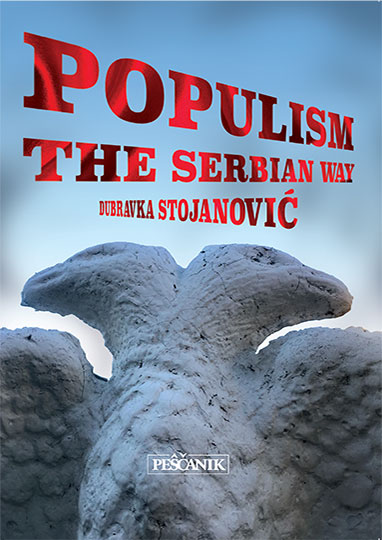
Finally, one thing in which the Balkans have had an advantage over Europe! Populism. Ever since that word entered general circulation, I have been getting ready to proclaim Serbia, and perhaps the entire Balkans, the vanguard of populism. To show that even we excel in something, that even we can explain to someone what’s waiting for them, what you – latecomers – have to expect, and how you might proceed!
The beginning of populism in Serbia dates from the early 1870s, from the populist socialism of Svetozar Marković and the radicalism of Nikola Pašić. After this, such regimes reproduced themselves, with very short intervals, in the course of the 20th century, through socialism, Milošević, all the way to Aleksandar Vučić. That is what gives me that superiority I mentioned at the beginning, because I have that know-how which you are just beginning to acquire.
What are the conclusions? Populism is not a codified ideology, it can be right-wing or left-wing, but its key characteristic is collectivist emotion which sucks in every individual, which crushes every pluralism. A populist movement always speaks in the name of an entire people, and the possibility that you can remain outside and think differently is excluded. It is a deception – it originates from economic and social embitterment as a movement against the establishment, but it will, in the end, additionally impoverish the population and substantially enrich the élite. As identity politics, it is a monistic and essentialist call to be, as the Brexiteers would say, one’s own man in one’s own country. How familiar that sounds to us!
Download PDF – Dubravka Stojanovic: Populism the Serbian Way
PEŠČANIK KNJIGE
The following two tabs change content below.

Dubravka Stojanović, istoričarka, magistrirala 1992 („Srpska socijaldemokratska partija i ratni program Srbije 1912-1918“), doktorirala 2001 („Evropski demokratski uzori kod srpske političke i intelektualne elite 1903-1914“) na Filozofskom fakultetu u Beogradu. Od 1988. do 1996. radi u Institutu za noviju istoriju Srbije, pa prelazi na Odeljenje za istoriju Filozofskog fakulteta u Beogradu, gde 2008. postaje vanredna, a 2016. redovna profesorka na katedri za Opštu savremenu istoriju. U saradnji sa Centrom za antiratne akcije 1993. radi na projektu analize udžbenika. Sa Milanom Ristovićem piše i uređuje školske dodatne nastavne materijale „Detinjstvo u prošlosti“, nastale u saradnji istoričara svih zemalja Balkana, koji su objavljeni na 11 jezika regiona. Kao potpredsednica Komiteta za edukaciju Centra za demokratiju i pomirenje u Jugoistočnoj Evropi iz Soluna, urednica je srpskog izdanja 6 istorijskih
čitanki za srednje škole. Dobitnica je odlikovanja Nacionalnog reda za zasluge u rangu viteza Republike Francuske. Knjige:
Iskušavanje načela.
Srpska socijaldemokratija i ratni program Srbije 1912-1918 (1994), Srbija i demokratija 1903-1914. Istorijska studija o “zlatnom dobu srpske demokratije” (2003, 2019) – Nagrada grada Beograda za društvene i humanističke nauke za 2003;
Srbija 1804-2004 (sa M. Jovanovićem i Lj. Dimićem, 2005),
Kaldrma i asfalt. Urbanizacija i evropeizacija Beograda 1890-1914 (2008),
Ulje na vodi.
Ogledi iz istorije sadašnjosti Srbije (2010),
Noga u vratima. Prilozi za političku biografiju Biblioteke XX vek (2011),
Iza zavese. Ogledi iz društvene istorije Srbije 1890-1914 (2013),
Rađanje globalnog sveta 1880-2015. Vanevropski svet u savremenom dobu (2015),
Populism the Serbian Way (2017),
Pola veka XX veka. Zbornik radova povodom 50 godina Biblioteke XX vek (ur, 2021),
Prošlost dolazi. Promene u tumačenju prošlosti u srpskim udžbenicima istorije 1913-2021 (2023).

Author: Dubravka Stojanović
Dubravka Stojanović, istoričarka, magistrirala 1992 („Srpska socijaldemokratska partija i ratni program Srbije 1912-1918“), doktorirala 2001 („Evropski demokratski uzori kod srpske političke i intelektualne elite 1903-1914“) na Filozofskom fakultetu u Beogradu. Od 1988. do 1996. radi u Institutu za noviju istoriju Srbije, pa prelazi na Odeljenje za istoriju Filozofskog fakulteta u Beogradu, gde 2008. postaje vanredna, a 2016. redovna profesorka na katedri za Opštu savremenu istoriju. U saradnji sa Centrom za antiratne akcije 1993. radi na projektu analize udžbenika. Sa Milanom Ristovićem piše i uređuje školske dodatne nastavne materijale „Detinjstvo u prošlosti“, nastale u saradnji istoričara svih zemalja Balkana, koji su objavljeni na 11 jezika regiona. Kao potpredsednica Komiteta za edukaciju Centra za demokratiju i pomirenje u Jugoistočnoj Evropi iz Soluna, urednica je srpskog izdanja 6 istorijskih čitanki za srednje škole. Dobitnica je odlikovanja Nacionalnog reda za zasluge u rangu viteza Republike Francuske. Knjige: Iskušavanje načela. Srpska socijaldemokratija i ratni program Srbije 1912-1918 (1994), Srbija i demokratija 1903-1914. Istorijska studija o “zlatnom dobu srpske demokratije” (2003, 2019) – Nagrada grada Beograda za društvene i humanističke nauke za 2003; Srbija 1804-2004 (sa M. Jovanovićem i Lj. Dimićem, 2005), Kaldrma i asfalt. Urbanizacija i evropeizacija Beograda 1890-1914 (2008), Ulje na vodi. Ogledi iz istorije sadašnjosti Srbije (2010), Noga u vratima. Prilozi za političku biografiju Biblioteke XX vek (2011), Iza zavese. Ogledi iz društvene istorije Srbije 1890-1914 (2013), Rađanje globalnog sveta 1880-2015. Vanevropski svet u savremenom dobu (2015), Populism the Serbian Way (2017), Pola veka XX veka. Zbornik radova povodom 50 godina Biblioteke XX vek (ur, 2021), Prošlost dolazi. Promene u tumačenju prošlosti u srpskim udžbenicima istorije 1913-2021 (2023).



